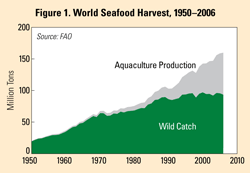Fish Farming Continues to Grow as World Fisheries Stagnate
World seafood production neared a record 160 million tons in 2006
thanks to aquaculture, or fish farming, which increased by more than 3
million tons. In contrast, fish caught in the wild declined for the
second year in a row.
This new Vital Signs trend on aquaculture includes data for total
world seafood harvest, farmed shrimp and salmon production, and the
top aquaculture producing countries as well as an analysis of the
growing trend toward farmed fish. It shows that:
- Asia and the Pacific region dominate global aquaculture
production, accounting for more than 90 percent. China is by far the
world leader with more than 45 million tons produced in 2006 --
about 70 percent of global output.
- Most of the stocks of the top 10 fished species are being fully
fished or are overexploited.
- Aquaculture growth continues to far outpace all other animal
food sectors, with average annual rates of 8.6 percent over three
decades, compared to 2.8 percent for meat production during the same
period.
- Projections indicate that seafood demand will continue to grow
along with population and incomes, especially as people in
developing countries increase their overall consumption of animal
products.
Historically, most of the world�s aquaculture has focused on
species that are relatively low on the food chain, including seaweeds,
shellfish, and herbivorous or omnivorous species like carp. But recent
trends indicate that stronger growth rates in carnivorous species like
shrimp and salmon will continue as demand increases. This has led to
environmental and health concerns that must be addressed for seafood
production to play a vital role in addressing food security and
meeting development goals.
Read the Vital Signs Update:
Fish Farming Continues to Grow as World Fisheries Stagnate
See the full list of available Vital Signs trends. Download
complete trends for $10 each.
|
Worldwatch Institute - 1776 Massachusetts
Avenue, NW, Washington, DC 20036
Tel 202.452.1999 - Fax 202.296.7365 -
www.worldwatch.org |
|
|
